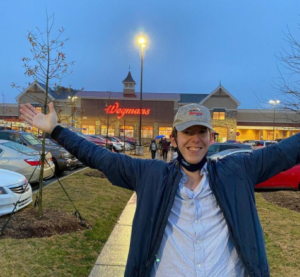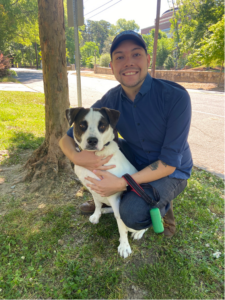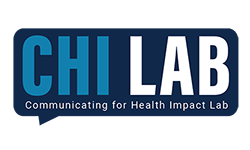Spotlight
Current Lab Member Spotlight

Emily Galper – Graduate Research Assistant (2021- Present)
Why do you believe health communication is important?
Making informed health decisions is a human right. Health communication is important because the ability to understand scientific language and make choices based on that understanding impacts your life and those around you. With the rise of social media which has become rife with misinformation and disinformation, it’s incumbent upon health communication experts to prioritize clear, evidence-based health information.
What does “Communicating for Health Impact” mean to you?
From my perspective, Communicating for Health Impact means ensuring that the scientific developments and findings are interpreted and disseminated to the public accurately while also maintaining an inclusive and holistic approach. Part of this holistic approach is informed by my background in Qi Gong. One of the founding principles of the Daoist approach to life is balance theory for health and wellness. The two approaches ground interventions in theory while simultaneously communicating information that empowers individuals to engage in healthy behaviors.
What do you enjoy most about working in the CHI Lab?
I enjoy collaborating with intelligent and hard-working individuals who motivate me to exceed my previous expectations. I have been able to work on complex research designs while feeling supported in pursuing my own academic goals. Part of the reason I joined the CHI Lab is because of the people and the culture they have created.
What are you working on now, and how did working in the CHI lab prepare you for that work?
As I am about to begin the second year of my Ph.D. program, most of my time is spent on coursework and my research assistant responsibilities. However, I have been working on publishing some of my master’s thesis research which examines communication about pornography use and its impact on the overall health of romantic relationships. I think academics are often siloed and encouraged to find our niche within academia. Although my work is topically distinct from what we do at the CHI Lab, many of the skills I’ve been developing within the lab (e.g., research design and implementation) have informed my approach to my research. To me, it is important to read beyond the scope of my subject area, collaborate with scholars from different backgrounds, and engage with communities I hope to better understand and help in order to truly embody inclusive health communication research.
What are your favorite things to do outside of work?
One of my favorite things to do outside of work is Qi Gong. I have been studying under a Grandmaster of Medical Qi Gong which includes Traditional Chinese Medicine (TCM) and arcane Daoist practices focusing on holistic health and longevity. As a PhD student, life is fast-paced with looming deadlines and I am finding that my studies under the Grandmaster complement the work I do in academia and have taught me humility, compassion, and perseverance.
Alumni Lab Member Spotlights

Alex Kresovich – Graduate Research Assistant (2018 – 2022)
Why do you believe health communication is important?
Health communication is important for two vital reasons. First, all of the most important scientific developments mean much less than we hope if we can’t effectively communicate about them with the public. Second, health communication and messaging can take on many different forms. For example, I’m studying how popular music referencing mental health difficulties influences U.S. youth attitudes and behavioral intentions. Health communication is around us 24/7/365.
What does “Communicating for Health Impact” mean to you?
With the advent of smartphones, text messaging, video messaging, and social media platforms, there are so many great — and not so great — implications of the health communication messages floating around for all different types of audiences. “Communicating for Health Impact” is about ensuring that communication tools — old and new — are used to effectively promote public good while diminishing health inequalities and disparities.
What did you enjoy most about working in the CHI Lab?
The collaboration! It’s such a pleasure to work with Dr. Noar and all the other wonderful students and staff who have been a part of the CHI Lab. The meetings are a blast! I love getting to exchange ideas and learn from so many smart people all committed to trying to make the world a better place and improving health communication. The people are my favorite part pf the CHI Lab!
What are you working on now, and how did working in the CHI Lab prepare you for that work?
I’m working on my dissertation looking at how celebrity pop music artists who have disclosed mental health difficulties could potentially be used as part of a mental health intervention aimed at improving help-seeking tendencies among depressed U.S. youth. Working in the CHI Lab helped me to understand different perspectives and aspects of the issue that I wouldn’t otherwise understand. While my dissertation research is different than most of the focus of the CHI Lab work, aspects of health communication — such as theoretical decisions, empirical designs, etc. — are all similarly informed. Being a part of the CHI Lab has given me a fantastic head start on my work and helped me to consider many different aspects of my work that I would have missed out on without this experience.
What are your favorite things to do outside of work?
Going to the new Wegmans in Chapel Hill (as you can tell by the picture). Outside of that, I love continuing my quest to try all of the fast-food chicken sandwiches (so far… Popeyes > KFC & Chick-Fil-A > Bojangles >>>>>> McDonalds & Wendy’s). I also love to hang out with my partner, my friends, and my sweet puppy Wally and watch either my favorite shows (Great British Bake Off) or my favorite sports teams (UGA football, Atlanta Hawks, Carolina basketball, New York Yankees).

Jacob Rohde – Graduate Research Assistant (2017 – 2021)
Why do you believe health communication is important?
Communication allows us to spread critical health-related information to large audiences. Now more than ever during the COVID-19 pandemic, disseminating accurate, evidence-based research through different communication mediums (e.g., public service announcements, reports) can inform the public and improve the health and wellbeing of communities.
What does “Communicating for Health Impact” mean to you?
Communicating for Health Impact is interdisciplinary. To me, it means developing, testing, and evaluating meaningful communication informed by multiple disciplines (from social science and medicine to policy initiatives) for public good.
What did you enjoy most about working in the CHI Lab?
The people! I love collaborative work and the CHI Lab helped me establish a network of scientists across different research fields. As a Ph.D. student, the CHI Lab offered a ton of opportunities and resources to start new projects and allowed me to jump into existing grant-funded work with some of the most skilled researchers at UNC.
What are you working on now, and how did working in the CHI lab prepare you for that work?
I’m currently a Cancer Prevention Fellow at the National Cancer Institute. As part of this fellowship, I’ve been given the opportunity to pursue a master’s degree in public health at the Harvard University T.H. Chan School of Public Health. For the most part, I’m working on expanding my skills in epidemiology and biostatistics to complement my health communication background through course work. In my free time (which is rare), I’ve also been working on publishing some of my dissertation research, which examines the role of eHealth as a communication medium for disease self-management.
What are your favorite things to do outside of work?
I have a rambunctious dog named Daniel (pictured above) who keeps me very busy. Surprisingly, he and I share a passion for the exact same sports teams, and in our free time, we love cheering on the Green Bay Packers, Milwaukee Bucks, and Carolina Tar heels!
